Analyzing Intercultural Communication for Effective Business Practices
VerifiedAdded on 2023/06/11
|7
|1468
|309
Essay
AI Summary
This essay delves into the importance of intercultural communication in today's globalized business environment. It defines intercultural communication as the interaction between individuals from different cultural backgrounds and highlights its crucial role in business expansion, understanding diverse customs, and fostering effective communication. The author reflects on the topic's significance, emphasizing its role in breaking down cultural barriers, enhancing negotiation skills, and promoting positive economic outcomes. The essay further explores how intercultural communication can be applied in future professional settings through practical knowledge, diversity management, training programs, and promoting open communication. It concludes that intercultural communication is integral to maintaining a peaceful work environment and making effective decisions in the international market.
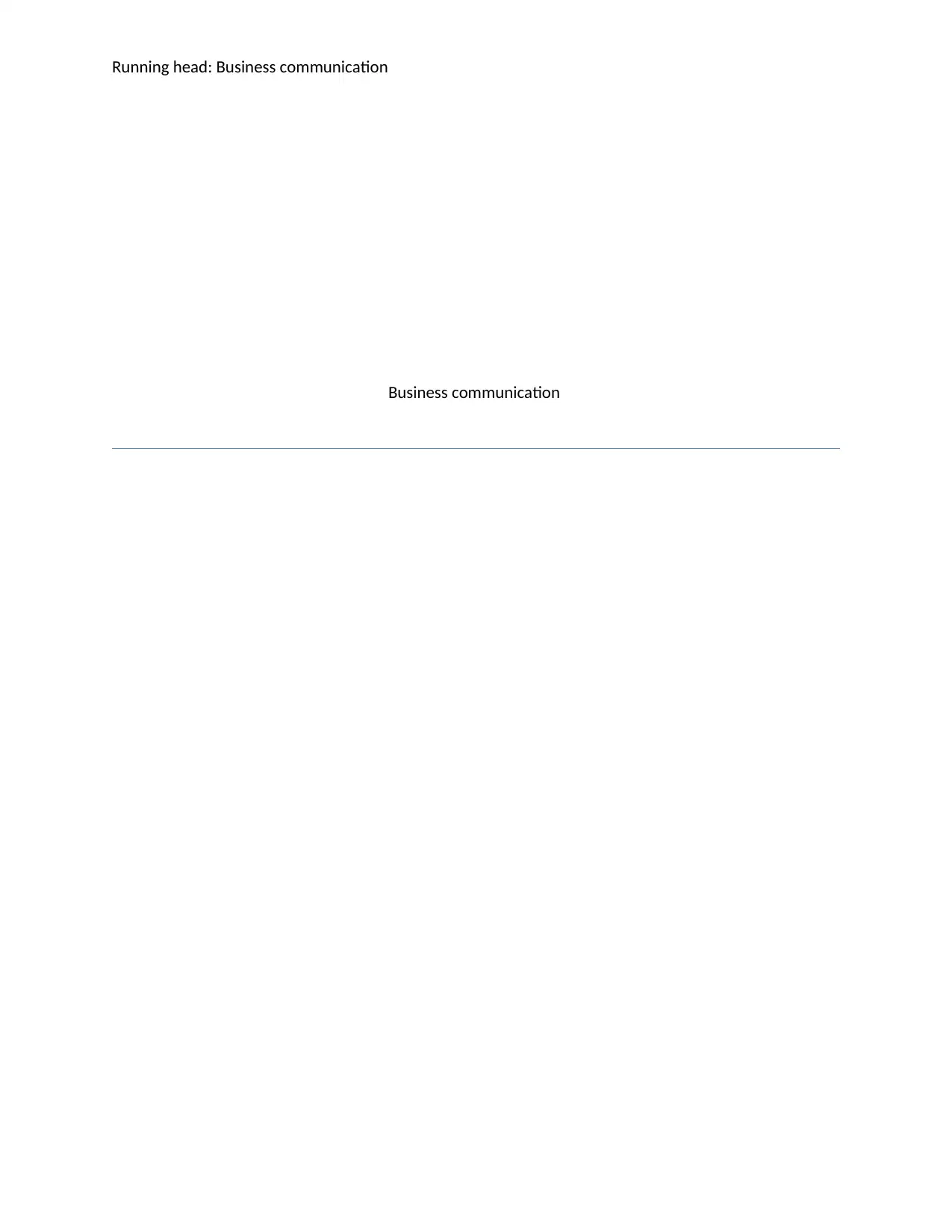
Running head: Business communication
Business communication
Business communication
Paraphrase This Document
Need a fresh take? Get an instant paraphrase of this document with our AI Paraphraser
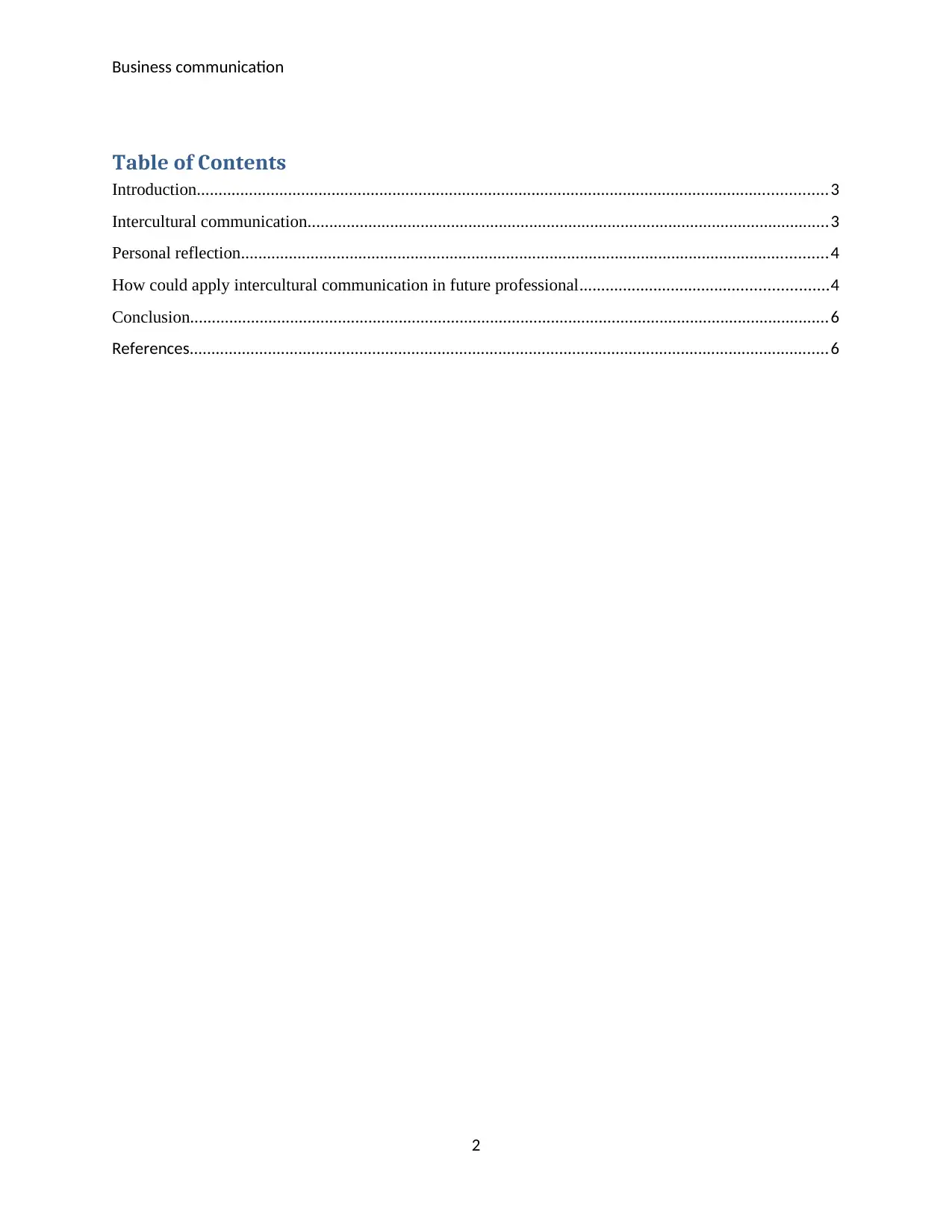
Business communication
Table of Contents
Introduction.................................................................................................................................................3
Intercultural communication........................................................................................................................3
Personal reflection.......................................................................................................................................4
How could apply intercultural communication in future professional.........................................................4
Conclusion...................................................................................................................................................6
References...................................................................................................................................................6
2
Table of Contents
Introduction.................................................................................................................................................3
Intercultural communication........................................................................................................................3
Personal reflection.......................................................................................................................................4
How could apply intercultural communication in future professional.........................................................4
Conclusion...................................................................................................................................................6
References...................................................................................................................................................6
2
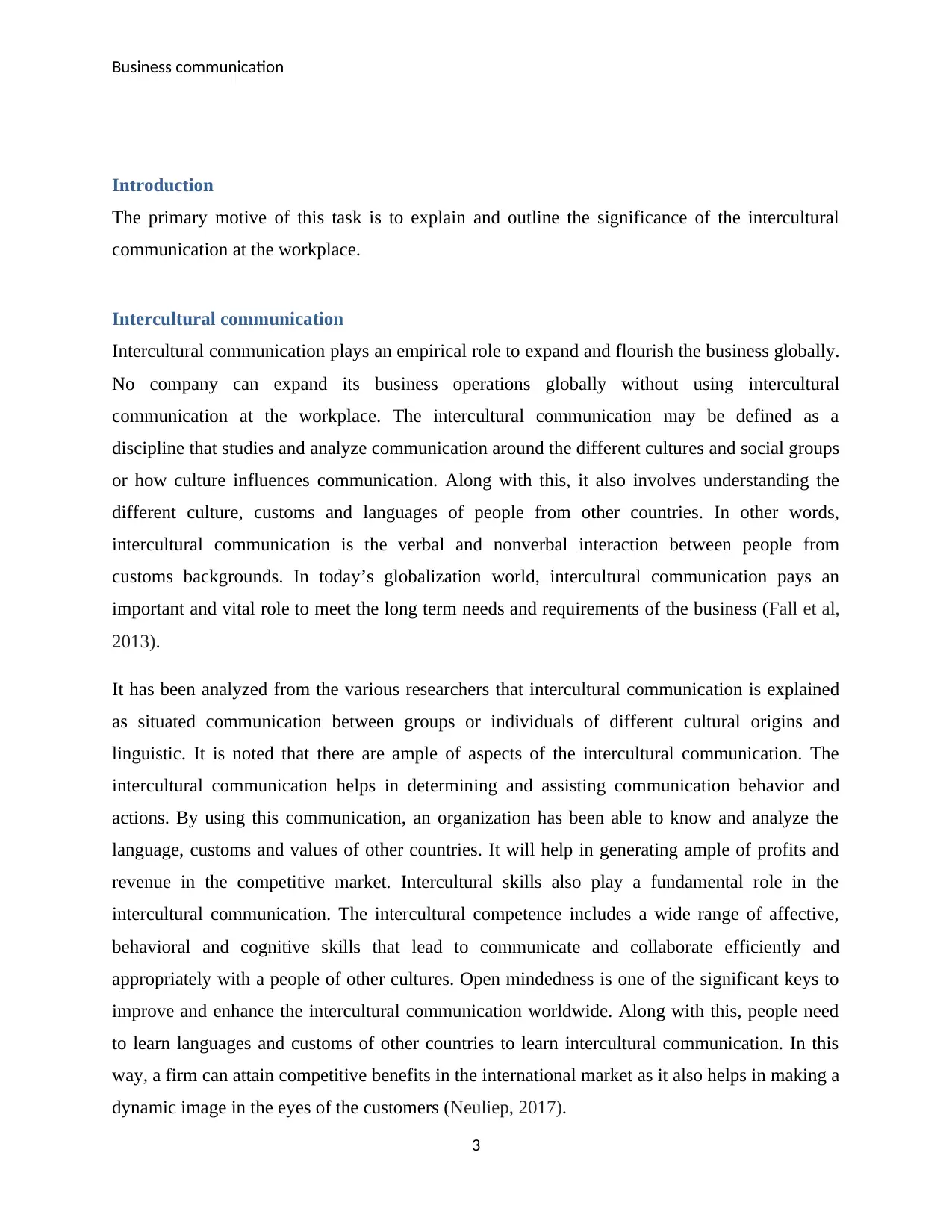
Business communication
Introduction
The primary motive of this task is to explain and outline the significance of the intercultural
communication at the workplace.
Intercultural communication
Intercultural communication plays an empirical role to expand and flourish the business globally.
No company can expand its business operations globally without using intercultural
communication at the workplace. The intercultural communication may be defined as a
discipline that studies and analyze communication around the different cultures and social groups
or how culture influences communication. Along with this, it also involves understanding the
different culture, customs and languages of people from other countries. In other words,
intercultural communication is the verbal and nonverbal interaction between people from
customs backgrounds. In today’s globalization world, intercultural communication pays an
important and vital role to meet the long term needs and requirements of the business (Fall et al,
2013).
It has been analyzed from the various researchers that intercultural communication is explained
as situated communication between groups or individuals of different cultural origins and
linguistic. It is noted that there are ample of aspects of the intercultural communication. The
intercultural communication helps in determining and assisting communication behavior and
actions. By using this communication, an organization has been able to know and analyze the
language, customs and values of other countries. It will help in generating ample of profits and
revenue in the competitive market. Intercultural skills also play a fundamental role in the
intercultural communication. The intercultural competence includes a wide range of affective,
behavioral and cognitive skills that lead to communicate and collaborate efficiently and
appropriately with a people of other cultures. Open mindedness is one of the significant keys to
improve and enhance the intercultural communication worldwide. Along with this, people need
to learn languages and customs of other countries to learn intercultural communication. In this
way, a firm can attain competitive benefits in the international market as it also helps in making a
dynamic image in the eyes of the customers (Neuliep, 2017).
3
Introduction
The primary motive of this task is to explain and outline the significance of the intercultural
communication at the workplace.
Intercultural communication
Intercultural communication plays an empirical role to expand and flourish the business globally.
No company can expand its business operations globally without using intercultural
communication at the workplace. The intercultural communication may be defined as a
discipline that studies and analyze communication around the different cultures and social groups
or how culture influences communication. Along with this, it also involves understanding the
different culture, customs and languages of people from other countries. In other words,
intercultural communication is the verbal and nonverbal interaction between people from
customs backgrounds. In today’s globalization world, intercultural communication pays an
important and vital role to meet the long term needs and requirements of the business (Fall et al,
2013).
It has been analyzed from the various researchers that intercultural communication is explained
as situated communication between groups or individuals of different cultural origins and
linguistic. It is noted that there are ample of aspects of the intercultural communication. The
intercultural communication helps in determining and assisting communication behavior and
actions. By using this communication, an organization has been able to know and analyze the
language, customs and values of other countries. It will help in generating ample of profits and
revenue in the competitive market. Intercultural skills also play a fundamental role in the
intercultural communication. The intercultural competence includes a wide range of affective,
behavioral and cognitive skills that lead to communicate and collaborate efficiently and
appropriately with a people of other cultures. Open mindedness is one of the significant keys to
improve and enhance the intercultural communication worldwide. Along with this, people need
to learn languages and customs of other countries to learn intercultural communication. In this
way, a firm can attain competitive benefits in the international market as it also helps in making a
dynamic image in the eyes of the customers (Neuliep, 2017).
3
⊘ This is a preview!⊘
Do you want full access?
Subscribe today to unlock all pages.

Trusted by 1+ million students worldwide
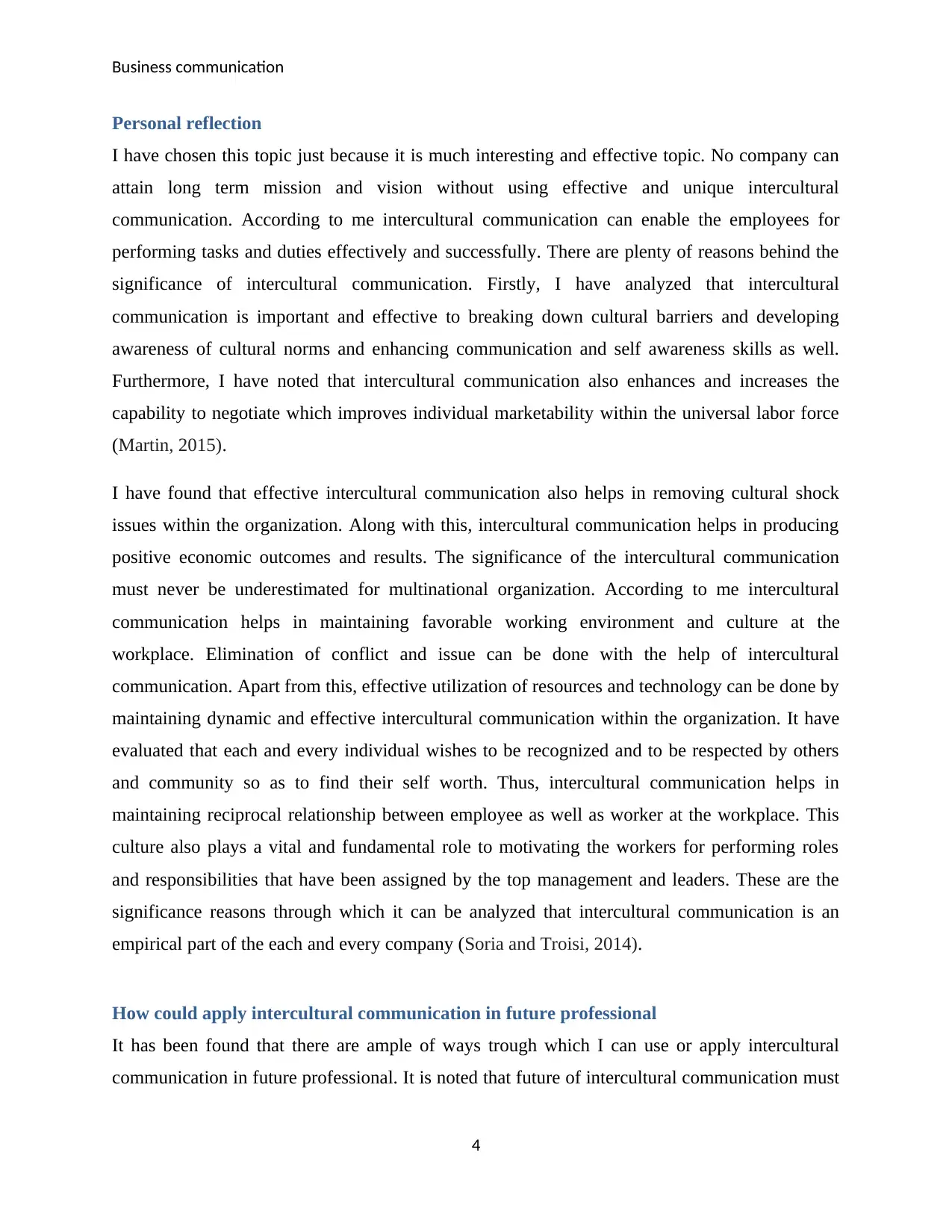
Business communication
Personal reflection
I have chosen this topic just because it is much interesting and effective topic. No company can
attain long term mission and vision without using effective and unique intercultural
communication. According to me intercultural communication can enable the employees for
performing tasks and duties effectively and successfully. There are plenty of reasons behind the
significance of intercultural communication. Firstly, I have analyzed that intercultural
communication is important and effective to breaking down cultural barriers and developing
awareness of cultural norms and enhancing communication and self awareness skills as well.
Furthermore, I have noted that intercultural communication also enhances and increases the
capability to negotiate which improves individual marketability within the universal labor force
(Martin, 2015).
I have found that effective intercultural communication also helps in removing cultural shock
issues within the organization. Along with this, intercultural communication helps in producing
positive economic outcomes and results. The significance of the intercultural communication
must never be underestimated for multinational organization. According to me intercultural
communication helps in maintaining favorable working environment and culture at the
workplace. Elimination of conflict and issue can be done with the help of intercultural
communication. Apart from this, effective utilization of resources and technology can be done by
maintaining dynamic and effective intercultural communication within the organization. It have
evaluated that each and every individual wishes to be recognized and to be respected by others
and community so as to find their self worth. Thus, intercultural communication helps in
maintaining reciprocal relationship between employee as well as worker at the workplace. This
culture also plays a vital and fundamental role to motivating the workers for performing roles
and responsibilities that have been assigned by the top management and leaders. These are the
significance reasons through which it can be analyzed that intercultural communication is an
empirical part of the each and every company (Soria and Troisi, 2014).
How could apply intercultural communication in future professional
It has been found that there are ample of ways trough which I can use or apply intercultural
communication in future professional. It is noted that future of intercultural communication must
4
Personal reflection
I have chosen this topic just because it is much interesting and effective topic. No company can
attain long term mission and vision without using effective and unique intercultural
communication. According to me intercultural communication can enable the employees for
performing tasks and duties effectively and successfully. There are plenty of reasons behind the
significance of intercultural communication. Firstly, I have analyzed that intercultural
communication is important and effective to breaking down cultural barriers and developing
awareness of cultural norms and enhancing communication and self awareness skills as well.
Furthermore, I have noted that intercultural communication also enhances and increases the
capability to negotiate which improves individual marketability within the universal labor force
(Martin, 2015).
I have found that effective intercultural communication also helps in removing cultural shock
issues within the organization. Along with this, intercultural communication helps in producing
positive economic outcomes and results. The significance of the intercultural communication
must never be underestimated for multinational organization. According to me intercultural
communication helps in maintaining favorable working environment and culture at the
workplace. Elimination of conflict and issue can be done with the help of intercultural
communication. Apart from this, effective utilization of resources and technology can be done by
maintaining dynamic and effective intercultural communication within the organization. It have
evaluated that each and every individual wishes to be recognized and to be respected by others
and community so as to find their self worth. Thus, intercultural communication helps in
maintaining reciprocal relationship between employee as well as worker at the workplace. This
culture also plays a vital and fundamental role to motivating the workers for performing roles
and responsibilities that have been assigned by the top management and leaders. These are the
significance reasons through which it can be analyzed that intercultural communication is an
empirical part of the each and every company (Soria and Troisi, 2014).
How could apply intercultural communication in future professional
It has been found that there are ample of ways trough which I can use or apply intercultural
communication in future professional. It is noted that future of intercultural communication must
4
Paraphrase This Document
Need a fresh take? Get an instant paraphrase of this document with our AI Paraphraser
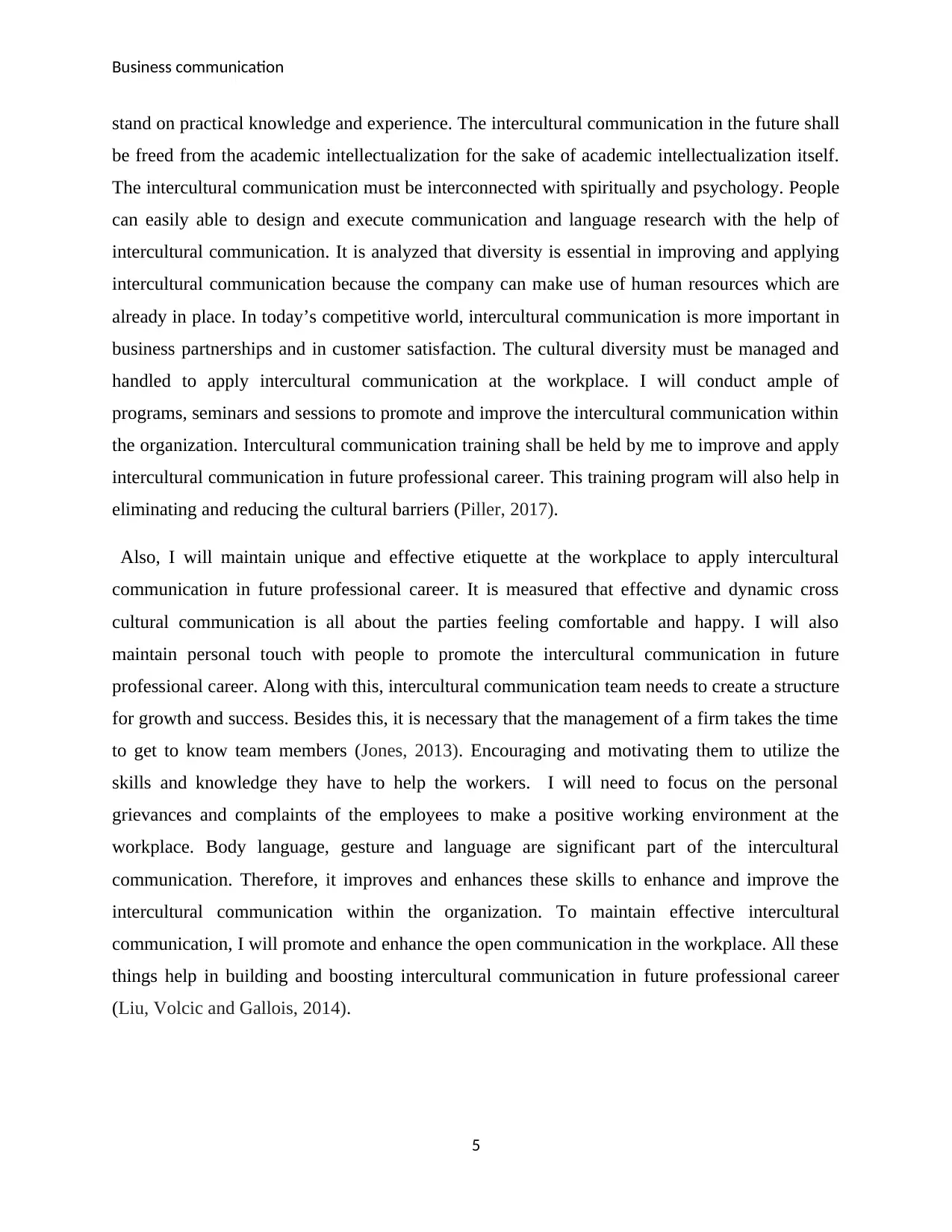
Business communication
stand on practical knowledge and experience. The intercultural communication in the future shall
be freed from the academic intellectualization for the sake of academic intellectualization itself.
The intercultural communication must be interconnected with spiritually and psychology. People
can easily able to design and execute communication and language research with the help of
intercultural communication. It is analyzed that diversity is essential in improving and applying
intercultural communication because the company can make use of human resources which are
already in place. In today’s competitive world, intercultural communication is more important in
business partnerships and in customer satisfaction. The cultural diversity must be managed and
handled to apply intercultural communication at the workplace. I will conduct ample of
programs, seminars and sessions to promote and improve the intercultural communication within
the organization. Intercultural communication training shall be held by me to improve and apply
intercultural communication in future professional career. This training program will also help in
eliminating and reducing the cultural barriers (Piller, 2017).
Also, I will maintain unique and effective etiquette at the workplace to apply intercultural
communication in future professional career. It is measured that effective and dynamic cross
cultural communication is all about the parties feeling comfortable and happy. I will also
maintain personal touch with people to promote the intercultural communication in future
professional career. Along with this, intercultural communication team needs to create a structure
for growth and success. Besides this, it is necessary that the management of a firm takes the time
to get to know team members (Jones, 2013). Encouraging and motivating them to utilize the
skills and knowledge they have to help the workers. I will need to focus on the personal
grievances and complaints of the employees to make a positive working environment at the
workplace. Body language, gesture and language are significant part of the intercultural
communication. Therefore, it improves and enhances these skills to enhance and improve the
intercultural communication within the organization. To maintain effective intercultural
communication, I will promote and enhance the open communication in the workplace. All these
things help in building and boosting intercultural communication in future professional career
(Liu, Volcic and Gallois, 2014).
5
stand on practical knowledge and experience. The intercultural communication in the future shall
be freed from the academic intellectualization for the sake of academic intellectualization itself.
The intercultural communication must be interconnected with spiritually and psychology. People
can easily able to design and execute communication and language research with the help of
intercultural communication. It is analyzed that diversity is essential in improving and applying
intercultural communication because the company can make use of human resources which are
already in place. In today’s competitive world, intercultural communication is more important in
business partnerships and in customer satisfaction. The cultural diversity must be managed and
handled to apply intercultural communication at the workplace. I will conduct ample of
programs, seminars and sessions to promote and improve the intercultural communication within
the organization. Intercultural communication training shall be held by me to improve and apply
intercultural communication in future professional career. This training program will also help in
eliminating and reducing the cultural barriers (Piller, 2017).
Also, I will maintain unique and effective etiquette at the workplace to apply intercultural
communication in future professional career. It is measured that effective and dynamic cross
cultural communication is all about the parties feeling comfortable and happy. I will also
maintain personal touch with people to promote the intercultural communication in future
professional career. Along with this, intercultural communication team needs to create a structure
for growth and success. Besides this, it is necessary that the management of a firm takes the time
to get to know team members (Jones, 2013). Encouraging and motivating them to utilize the
skills and knowledge they have to help the workers. I will need to focus on the personal
grievances and complaints of the employees to make a positive working environment at the
workplace. Body language, gesture and language are significant part of the intercultural
communication. Therefore, it improves and enhances these skills to enhance and improve the
intercultural communication within the organization. To maintain effective intercultural
communication, I will promote and enhance the open communication in the workplace. All these
things help in building and boosting intercultural communication in future professional career
(Liu, Volcic and Gallois, 2014).
5
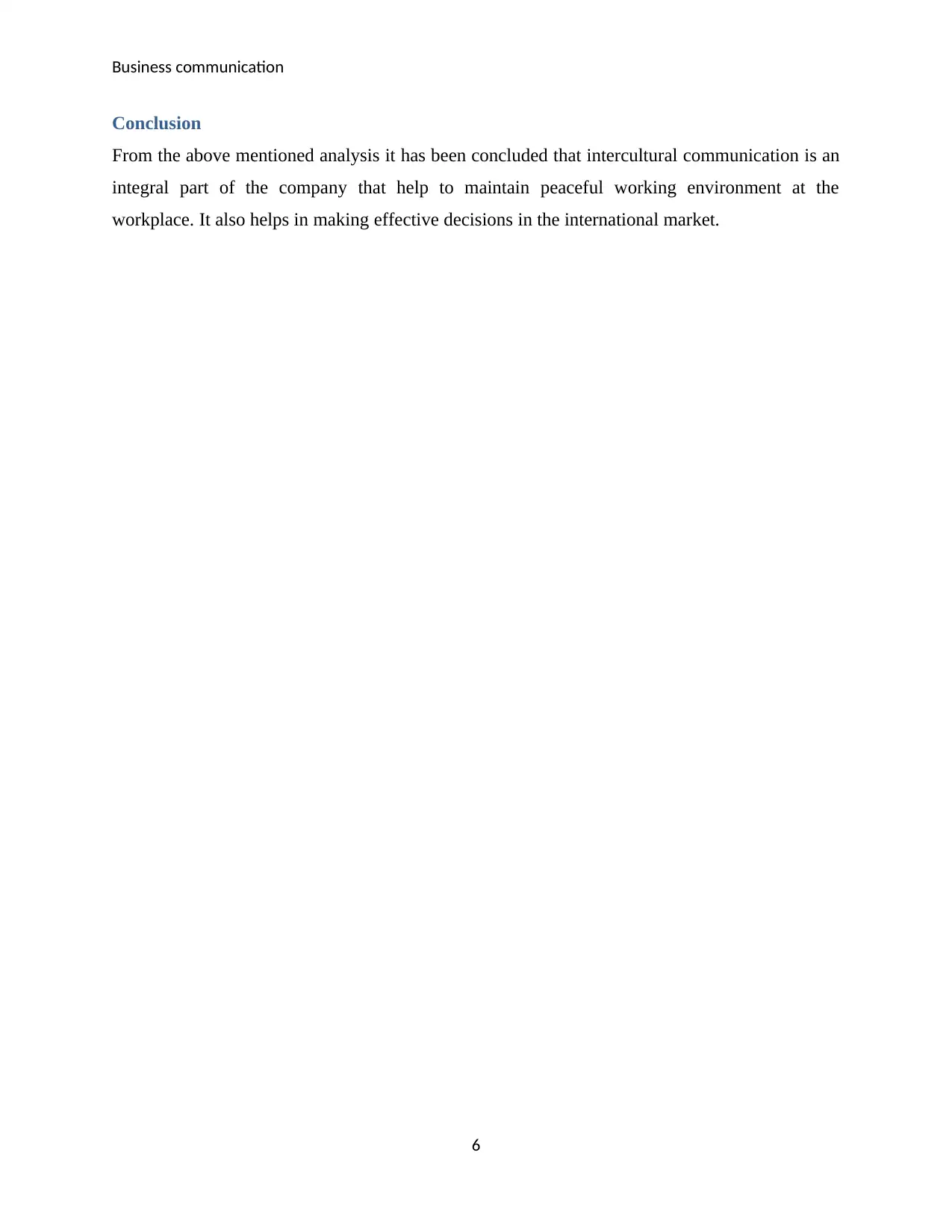
Business communication
Conclusion
From the above mentioned analysis it has been concluded that intercultural communication is an
integral part of the company that help to maintain peaceful working environment at the
workplace. It also helps in making effective decisions in the international market.
6
Conclusion
From the above mentioned analysis it has been concluded that intercultural communication is an
integral part of the company that help to maintain peaceful working environment at the
workplace. It also helps in making effective decisions in the international market.
6
⊘ This is a preview!⊘
Do you want full access?
Subscribe today to unlock all pages.

Trusted by 1+ million students worldwide
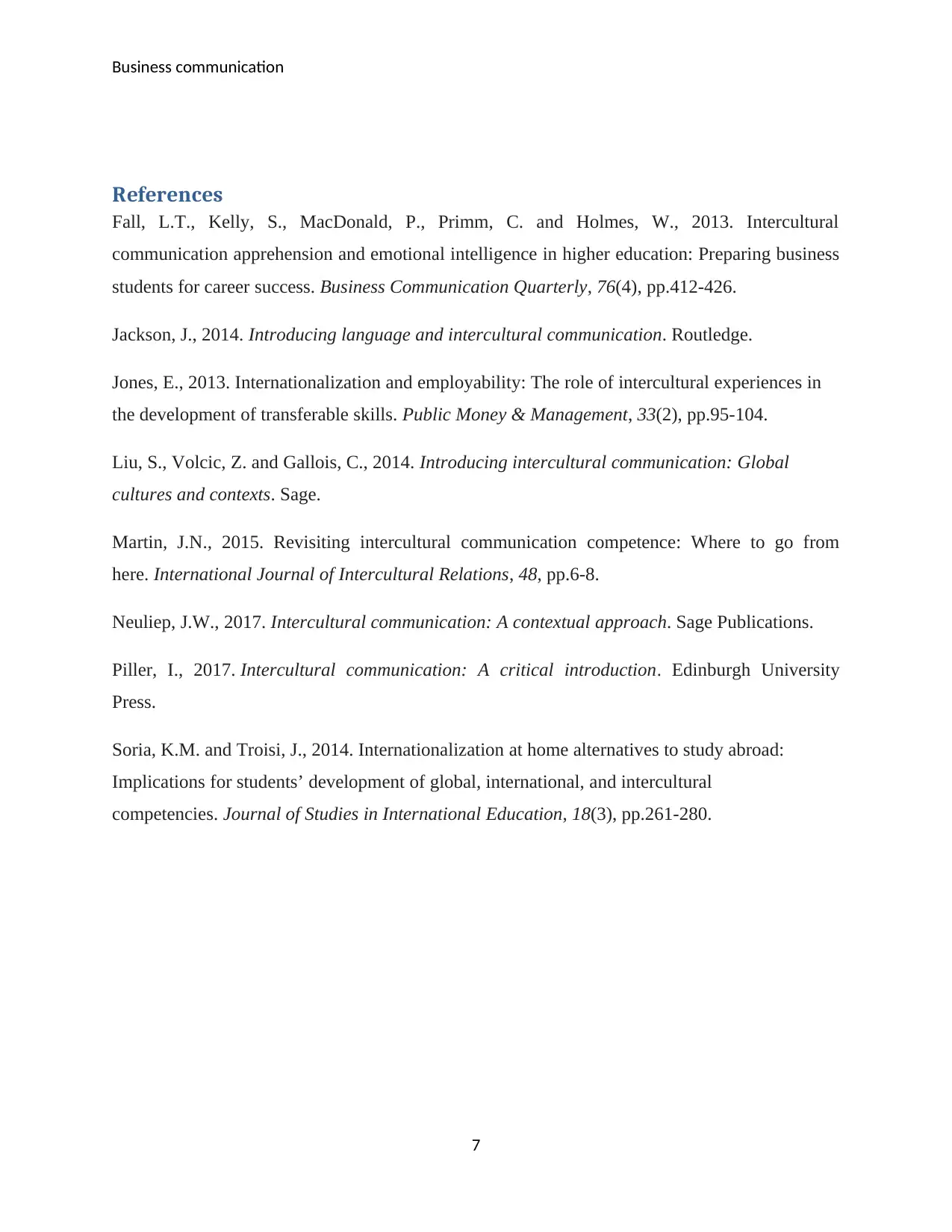
Business communication
References
Fall, L.T., Kelly, S., MacDonald, P., Primm, C. and Holmes, W., 2013. Intercultural
communication apprehension and emotional intelligence in higher education: Preparing business
students for career success. Business Communication Quarterly, 76(4), pp.412-426.
Jackson, J., 2014. Introducing language and intercultural communication. Routledge.
Jones, E., 2013. Internationalization and employability: The role of intercultural experiences in
the development of transferable skills. Public Money & Management, 33(2), pp.95-104.
Liu, S., Volcic, Z. and Gallois, C., 2014. Introducing intercultural communication: Global
cultures and contexts. Sage.
Martin, J.N., 2015. Revisiting intercultural communication competence: Where to go from
here. International Journal of Intercultural Relations, 48, pp.6-8.
Neuliep, J.W., 2017. Intercultural communication: A contextual approach. Sage Publications.
Piller, I., 2017. Intercultural communication: A critical introduction. Edinburgh University
Press.
Soria, K.M. and Troisi, J., 2014. Internationalization at home alternatives to study abroad:
Implications for students’ development of global, international, and intercultural
competencies. Journal of Studies in International Education, 18(3), pp.261-280.
7
References
Fall, L.T., Kelly, S., MacDonald, P., Primm, C. and Holmes, W., 2013. Intercultural
communication apprehension and emotional intelligence in higher education: Preparing business
students for career success. Business Communication Quarterly, 76(4), pp.412-426.
Jackson, J., 2014. Introducing language and intercultural communication. Routledge.
Jones, E., 2013. Internationalization and employability: The role of intercultural experiences in
the development of transferable skills. Public Money & Management, 33(2), pp.95-104.
Liu, S., Volcic, Z. and Gallois, C., 2014. Introducing intercultural communication: Global
cultures and contexts. Sage.
Martin, J.N., 2015. Revisiting intercultural communication competence: Where to go from
here. International Journal of Intercultural Relations, 48, pp.6-8.
Neuliep, J.W., 2017. Intercultural communication: A contextual approach. Sage Publications.
Piller, I., 2017. Intercultural communication: A critical introduction. Edinburgh University
Press.
Soria, K.M. and Troisi, J., 2014. Internationalization at home alternatives to study abroad:
Implications for students’ development of global, international, and intercultural
competencies. Journal of Studies in International Education, 18(3), pp.261-280.
7
1 out of 7
Related Documents
Your All-in-One AI-Powered Toolkit for Academic Success.
+13062052269
info@desklib.com
Available 24*7 on WhatsApp / Email
![[object Object]](/_next/static/media/star-bottom.7253800d.svg)
Unlock your academic potential
Copyright © 2020–2026 A2Z Services. All Rights Reserved. Developed and managed by ZUCOL.





